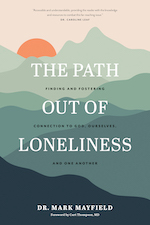“Mark, I don’t even know where to begin,” Matt stated as we talked over coffee. “The needs of my church are so great that I often feel paralyzed. I don’t know what the first step should even be.”
It can seem overwhelming for a church to care for the vast needs of the congregation. With the increase in mental health needs, this task can appear almost impossible. Instead of trying to be all things to the church community, what would it be like if the church focused on helping the lonely? Loneliness is defined as:
“The state of being unseen or unnoticed relationally, mentally, emotionally, physically, or spiritually. It can be driven by a lack of purpose or meaning, relationship and/or identity and is marked by a deep sense of hopelessness”
(Mayfield, 2021, pg. 24)
Here are the five action steps I shared with Matt—the five action steps every church should implement as they care for the lonely. (These are not in any particular order. They should be viewed as specific postures rather than steps.)
Step One: Be Intentional About How You Talk About Mental and Emotional Health.
I am a firm believer that language creates culture. Therefore, it is important to evaluate how you talk about these topics from the pulpit and within the overall cultural framework of your church. Does how you engage this conversation draw people into the conversation and invite them to the table, or does it further ostracize them, thus deepening their loneliness?
Step Two: Be Open, Vulnerable, and Honest About Your Own Story.
I have been a part of many churches throughout my life. Some were set on “putting on a show,” whereas others were warm, welcoming, and inviting. They led by example. People struggling with loneliness are always watching and wondering if it is safe to engage and share. The greatest way to break down those barriers is to share your own story.
Step Three: Intentionally Create Opportunities to Belong.
To begin breaking down the walls produced by loneliness, a church should have clear paths to belonging: Alpha groups, small groups, key volunteers inviting visitors out for lunch, etcetera. If someone has the courage to show up on a Sunday morning, they are ready for change and, most likely, asking for community.
Step Four: Create Pathways for Support.
Maybe the church cannot meet all the needs of those struggling with loneliness, but they certainly can be the conduit for connection. Similar to step three, it is important to connect those struggling with a trusted pastoral counselor, spiritual advisor, mentor, or Christian counselor. (However, do not hand someone off and be “done” with them. Rather, hand them off for greater support and then continue to care for them with the action items from step three.)
Step Five: Train Your Staff and Key Volunteers in the Basics of Mental and Emotional Health.
This can seem like an arduous task, yet it is worth the small investment as it helps build up a community of caregivers to support the mission and ministry of the church. You often don’t know what you don’t know until you know it (this is a comment I get after I do these trainings). If you would like a trusted list of resources, reach out to me through my website, drmayfield.com.
Supporting those who are walking along the path of loneliness doesn’t require more programs—it requires purposeful training and intentional relationship. We must reflect on the mission and ministry of Christ and model how he saw, valued, and loved people without compromising relationship or truth. We, as the church, must create opportunities for people to belong first and then believe. When, and only when, we choose to take this posture will we be able to walk people out of their pervasive loneliness.
 Dr. Mark Mayfield is a former pastor, a licensed professional counselor (LPC), a board-certified counselor, and founder and CEO of Mayfield Counseling Centers. He has more than 14 years of professional counseling experience in clinical, judicial, and faith-based counseling settings across a wide range of patient demographics. Mayfield has professional experience in treating and addressing anxiety, depression, and PTSD, substance abuse, domestic violence, self-injury, and suicide. He is passionate about the integration of faith and mental health and especially equipping pastors and leaders to be frontline mental and emotional health caregivers. He has been featured in prominent media outlets including Woman’s Day, Hello Giggles, NBC, Reader’s Digest, Byrdie, and more. Dr. Mayfield is on a list of mental health professionals that was invited to the White House in December 2019 and has had periodic calls with the White House to discuss mental health in America. He lives with his family near Colorado Springs.
Dr. Mark Mayfield is a former pastor, a licensed professional counselor (LPC), a board-certified counselor, and founder and CEO of Mayfield Counseling Centers. He has more than 14 years of professional counseling experience in clinical, judicial, and faith-based counseling settings across a wide range of patient demographics. Mayfield has professional experience in treating and addressing anxiety, depression, and PTSD, substance abuse, domestic violence, self-injury, and suicide. He is passionate about the integration of faith and mental health and especially equipping pastors and leaders to be frontline mental and emotional health caregivers. He has been featured in prominent media outlets including Woman’s Day, Hello Giggles, NBC, Reader’s Digest, Byrdie, and more. Dr. Mayfield is on a list of mental health professionals that was invited to the White House in December 2019 and has had periodic calls with the White House to discuss mental health in America. He lives with his family near Colorado Springs.

